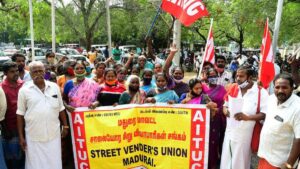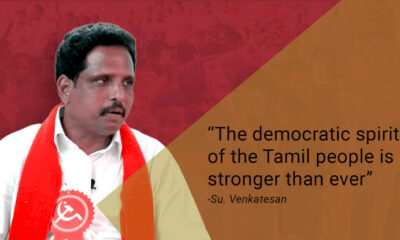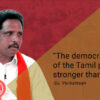Politics

In the heart of Tamil Nadu, Madurai is experiencing an unprecedented rise in street vendors, with numbers jumping from around 6,000 in 2018 to nearly 19,550 in 2025. This three-fold growth has transformed the city’s streets, marketplaces, and residential areas, creating a vibrant yet chaotic economic ecosystem.
While vendors contribute to the city’s economy and culture, their rapid increase has raised pressing concerns about traffic congestion, sanitation, public safety, and governance failures. Urban planners argue that Madurai must now make tough policy choices to balance livelihoods with order, development, and heritage preservation.
Why Are Street Vendors Increasing?
Several factors explain the sudden surge in street vending across Madurai:
1. Economic Pressures: Rising unemployment and inflation have pushed many into informal vending for survival.
2. Urban Migration: Madurai’s growth as a trade and education hub attracts people from nearby villages seeking income opportunities.
3. Tourism Appeal: As a historic temple city, Madurai attracts thousands of visitors daily, creating natural demand for street food, handicrafts, and souvenirs.
4. Lack of Regulation: Weak enforcement of vending laws has allowed vendors to expand without oversight, turning sidewalks and junctions into crowded bazaars.
The Legal Gap: Delayed Implementation of the 2014 Act
The Street Vendors (Protection of Livelihood and Regulation of Street Vending) Act, 2014 was meant to protect vendors’ rights while regulating their activities through:
- Formation of a Town Vending Committee (TVC)
- Allocation of designated vending zones
- Issuance of certificates of vending
- Regulation of non-vending zones
But in Madurai, this Act remains poorly implemented. The Town Vending Committee has not been fully operational, leaving vendors vulnerable to eviction and corruption while residents complain about encroachment and traffic chaos.
Recently, the Madurai Corporation passed a resolution to conduct elections for the vending committee, a long-awaited step toward enforcing structured regulation.
Voices from the Ground
Vendors’ Perspective: Street vendors argue they provide affordable goods and services to common people. “We are not against rules. We just want fair vending zones where we won’t be harassed or evicted suddenly,” says Ramesh, a fruit vendor near Periyar bus stand.
Residents’ Concerns: Many citizens believe uncontrolled vending clogs footpaths, creates garbage piles, and increases traffic risks. “Even near hospitals and schools, vendors block entrances. It is becoming unsafe,” says Meena, a school teacher in Madurai South.
Officials’ Dilemma: Urban planners and corporation officials admit the difficulty of balancing growth and governance. “We cannot deny people their livelihood, but we also cannot compromise on the city’s master plan,” a civic authority official noted.
The Road Ahead: Possible Solutions
Experts suggest a multi-pronged approach to address this growing challenge:
1. Activate the Town Vending Committee quickly to legalize, regulate, and support vendors.
2. Designate vending zones near markets, bus stands, and tourist spots, while protecting non-vending areas like schools and hospitals.
3. Introduce ID cards and digital payments to reduce bribery, harassment, and cash dependence.
4. Waste management systems tailored for street vending clusters.
5. Awareness campaigns to build cooperation between residents, vendors, and officials.
6. Integration with tourism projects so vendors contribute to Madurai’s “City of Gastronomy” brand.
Conclusion
The story of street vending in Madurai reflects the intersection of livelihood, urban planning, and politics. Vendors have become both an economic necessity and a governance challenge. How political leaders handle this issue — with fairness, transparency, and long-term planning — will decide whether Madurai evolves into a model city of inclusive growth or continues struggling with unregulated chaos.
As Madurai politics heats up ahead of elections, street vendors may well become one of the most influential voices shaping the city’s future.








